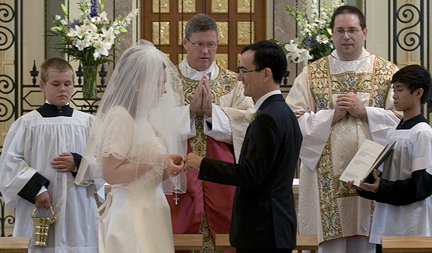I recently became aware of an exchange between Dr. Mark Lowery and Christopher West that took place in around the turn of the year 2002. Dr. Lowery’s assessment of Mr. West’s work was fair. Like many today, he commended the Theology of the Body apologist for his flair getting across to audiences around the country the reason why “the bedroom needs the Church.” And like many today, he expressed his reservations about the way in which West “sexualizes Christianity.” Lowery intimates that a kind of inversion has taken place in West’s understanding of the relationship between sexuality and Christianity:
Put another way, so clearly does he see how sexuality must be taken up into Christianity that he can give the impression that Christianity has been taken up into sexuality.
The Great Sign
I made essentially the same point some time ago when I asserted that West is misusing theological analogy. The basis for the use analogy in theology is the fact that created things reflect the Creator. God leaves signs of Himself in the things He creates, and the truths that he reveals to us supernaturally illumine the meaning of the signs. Hence, for example, marriage and sexuality reflect that communion of the three Divine Persons and the revelation of the Blessed Trinity helps us to understand the meaning of sexual union. However, it would be an unnatural reversal to project the reality of the sign onto God. Hence, while it is true that sexual pleasure is a faint reflection of the bliss of heaven, the inverse is not true, namely that heaven is like the “ultimate climax.”
Over the years West has tried to qualify this remark and suggest that he means this in a very restricted sense, but in effect, when he says things like this, or compares the Easter Liturgy to a fertility rite, or proposes that the virginal conception of Our Lord is aptly described impregnation by the seed of God, he really is doing exactly what Dr. Lowery suggested nine years ago. He is sexualizing Christianity. So when Dr. Schindler responded to West’s Nightline interview, he made essentially the same contention proposed by Dr. Lowery:
In the end, West, in his disproportionate emphasis on sex, promotes a pansexualist tendency that ties all important human and indeed supernatural activity back to sex without the necessary dissimilitudo [unlikeness].
Same Old Thing
What interests me most about this, and the reason I am posting on it, is that it does not seem that much has changed over the last nine years. The recent firestorm over the Nightline interview is not really a new controversy, though to some it might seem new, due to the fact that not many dared to challenge West publically on his positions before then. But neither is West’s response to the Nightline controversy new. He uses his same old standby arguments he has been using for years, namely 1) that people take exception to his form because he is addressing the problems of sexuality frankly in a popular way, and 2) that for this reason people have taken him out of context, and really object, not to his position, but to that of John Paul II.
Over the years he has refined his argument by focusing on his contention that the real reason anyone objects to the substance and manner of his presentation is that they are prudes who are afraid of their bodies and are projecting hidden sexual anxiety onto him. This is his failsafe. Any objection can be dismissed as downplaying the value of sexuality, as treating it as something dirty, or worse.
This fact, along with his augmented reputation as the authority on TOB, has allowed West to be less forthcoming in his responses to his critics than he has in the past. For almost six months he withheld a response from those who took exception to his Nightline presentation, and rendered one only after having received a quasi-canonization of his work from Cardinal Rigali and Bishop Rhoades.
Slippery Fish
When he did finally respond, his statement was completely generic. He asserted that the “pivotal question” in the whole controversy is that of the victory of redeemed man over the domination of concupiscence, declaring that John Paul affirms it and that his critics deny it. I presume he really believes this, but that must be because, as he admits, he sees the Theology of the Body as a
“new lens through which to view the most essential theological and anthropological truths of the faith.
So while he does not admit to “sexualizing Christianity,” in the sense that he has really added anything to the reality of Christianity, neither does he deny that that the Christian view of reality is sexual. Hence, it is telling that in his response to his critics he makes no rebuttal to the charge of pansexualism. All he does is insist that anyone who disagrees with him disagrees with the pope.
So when, on the ground of the absence of patristic and magisterial evidence, critics object to his claiming that the Paschal candle is a phallic symbol he contends really they are just prudes and just can’t handle the teaching of John Paul II. Or more precisely, he just ignores the specific criticism and chooses only to speak in generalities about the “pivotal question.” All of which is ironic considering that Professor Janet Smith and Michael Waldstein came running to West’s defense with cries of foul on the ground that Dr. Schindler’s critique was not specific enough.
The Real JP II
But concerning the “pivotal question,” West is quite forthcoming. He marshals his legions of quotations from the text of the Theology of the Body, asserting typically that everything he says is already said by the pope. This also he has been doing for years. So, for example, when West attempts to answer the charge of Dr. Lowery that he has replaced the more fundamental truth of “the Trinitarian life, dwelling in us as grace, through the Incarnation” with sex, he replies:
Lowery is right: Grace belongs at the foundation of Christian truth. But how is grace communicated to man? Without this, grace remains abstract. John Paul stresses that in creation grace was communicated “through the union of the first man and woman in … marriage.” In redemption this same grace is communicated through “the indissoluble union of Christ with the Church, which … Ephesians presents as the nuptial union of spouses” (Oct. 13, 1982).
In the reality this is what the Holy Father says in context:
In this way the Mystery hidden from all eternity in God—a mystery that in the beginning in the sacrament of creation became a visible reality through the union of the first man and the first woman in the perspective of marriage—becomes in the sacrament of redemption a visible reality in the indissoluble union of Christ with the Church, which the author of Ephesians presents as the spousal union of the two, husband and wife (Waldstein translation, 4, see original translation from which West most likely worked for his reply to Lowery).
Nowhere here does the Holy Father say what West claims he does, namely, that “in creation grace was communicated ‘through the union of the first man and woman in … marriage.’” John Paul II is talking about the transformation of marriage from a “sacrament of creation” in the garden to a “sacrament of redemption” on the cross. And the point he is really making is that the real source of grace is the nuptial mystery of Christ’s union with the Church.
In both cases marriage is a sign. It makes the invisible visible. However, the Holy Father is careful to point out that the sign does not mean “a total clearing of the mystery.” In fact, he says:
The visibility of the Invisible belongs thus to the order of signs, and the “sign” merely indicates the reality of the mystery, but does not “unveil” it (5).
None of this suggests we need to be fascinated with nakedness and the mechanics of sex in order to perceive the sign. Indeed, the reference to the fact that signs point to the mystery but do not unveil it, suggests exactly the opposite.
Dr. Lowery, like West’s other critics over the years, does not seek to minimize the validity of the nuptial analogy maintained by St. Paul in the fifth chapter of his Letter to the Ephesians, nor its reaffirmation by Pope John Paul. The charge of Lowery was the sexualization of Christianity not the adherence to fundamental value of the nuptial analogy. The difference is between the two is to understand the importance of marriage, in its whole reality, as a fundamental sign, or to see coital images in everything Christian. The first is the assertion of John Paul II, the second is that of Christopher West.
That’ll Do It
This, again, is just another example of the theological method of Christopher west, whereby he takes a passage from TOB or from the writings of the saints and forces it into labor for which it was never intended. And then when anyone disagrees, he dismisses the objection with the assertion that his critic is out of step with the pope.
This has been going on for an awful long time. Hopefully at West’s Theology of the Body Congress coming up in July he will take the opportunity to correct some of these mistakes and abandon once for all his pansexualism. He does so much good work. Why should he continue to undermine it by error? Unfortunately, the literature does not sound promising:
Because the Theology of the Body is rooted in the Catholic sacramental worldview, it is destined to affect all aspects of faith and life—from worship, to how we conduct business, to how we experience leisure, to how we live out our creation as male and female. It is for these reasons that we have been compelled to gather some of the most renowned teachers of the Catholic faith and Theology of the Body.
When West uses the term Theology of the Body in contexts like this, read “sexuality,” because when he uses umbrella terms like TOB and “nuptiality,” he is trying to place his preoccupation with sex within the context of the Church’s teaching. The problem is that, as Dr. Lowery indicated, sexuality needs to be taken up into Christianity, not Christianity into sexuality.
Filed under: Catholicism, Chivalry, Culture, Husbands, Marriage, Men, Religion, Wives, Women Tagged: Christopher West, David L. Schindler, Dawn Eden, Dr. Mark Lowery, Human Sexuality, Janet Smith, John Paul II, Michael Waldstein, Prudery, Theology of the Body

Go to Source








Very interesting commentary on the issue. I had heard some gripes about some things that Christopher West had taught a good 5-7 years ago, but had not actually seen or heard them until recently. In particular the Easter candle as a phalic symbol. Before I heard that one, I would have been hard pressed to find fault with anything Christopher West said. But, that was just so off kilter that it made me think … and enabled me to read through a different lense some well thought out commentary on the issue such as this.
As an aside, the absurdity of the Easter candle as phalic symbol analogy makes me think of that passage from G.K. Chesterton’s Everlasting Man where he remarks on the absurdity of a church spire as a phalic symbol. The main difference between the two scenarios is that Chesterton’s friend was not a practicing Christian. Christopher West, on the other hand, is. What does this say about the state of the Church when otherwise seemingly devout Christians spout absurdities in their preaching that were, in the past, confined to the non-believers? Or am I reading too much into this? Thoughts?
I think Mr. West’s statement was sincere and express willingness to take criticism and improve his presentations. I think we need to give him a chance and give him the benefit of the doubt and see what improvements he will make. From what I understand, his books are excellent; it is his presentations that have caused many to question his interpretations of TOB teaching. Can anyone recommend other authors or presenters that may have a clear orthodox view of JPII TOB?
John,
I commented on the Chesterton anecdote here, where I examine the validity of the alleged symbolism of the Easter Candle.
With respect to the “absurdities” you mention, I believe many Catholic thinkers have succumbed to the habit of finding the areas in which speculation seems to be permissible and then allowing their own personal experience to serve as the guide. Their estimation of how far they can go is based on plausibility and probability relative to magisterial pronouncements, but pays little or no attention to whether what they propose is a real development of doctrine, or just something that has not been formally condemned.
See Venerable Newman’s An Essay on the Development of Christian Doctrine for the an example of a careful theologian’s attempt to discern which probabilities are actual developments and those that are just wild speculations and therefore, not developments but corruptions.
Thomas,
Well, many have been waiting an awful long time for clarifications from CW.
I would recommend Stever Kellymeyer’s Sex and the Sacred City as a excellent starting point because it places Theology of the Body in the larger context of the Church’s ordinary magisterium, and and also in the larger context of family life. It is a great example of the hermeneutic of continuity in action.
At 100 pages, it is also fairly brief and serves a a great introduction.